Business Law Report: Analysis of UK Law, Business Impact, Disputes
VerifiedAdded on 2020/10/22
|15
|4702
|408
Report
AI Summary
This report provides a comprehensive overview of UK business law, commencing with an exploration of the diverse sources of law, including legislation, customs, judicial decisions, international conventions, and statutes. It delves into the role of the government in law-making, elucidating the stages involved in the legislative process. The report then analyzes the impact of company, employment, and contract law on business operations, referencing key legislation such as the Companies Act 2006, the Equality Act 2010, and the Contract Act 1990. Furthermore, it examines the legal formation, management, and funding of different types of business organizations. The report concludes by identifying and recommending appropriate legal solutions for resolving various business disputes, offering insights into the effectiveness of the UK legal system in relation to reforms and development.
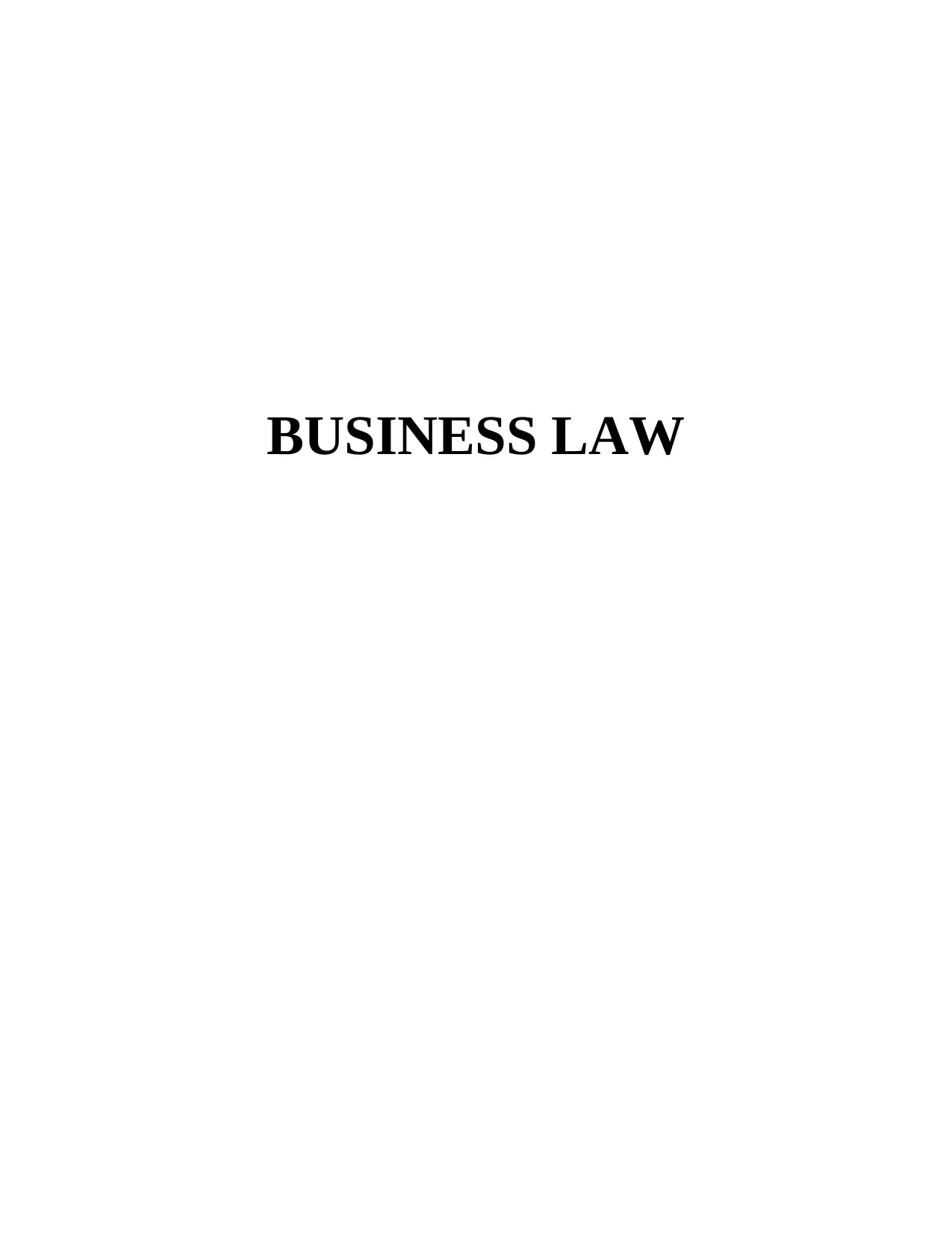
BUSINESS LAW
Paraphrase This Document
Need a fresh take? Get an instant paraphrase of this document with our AI Paraphraser
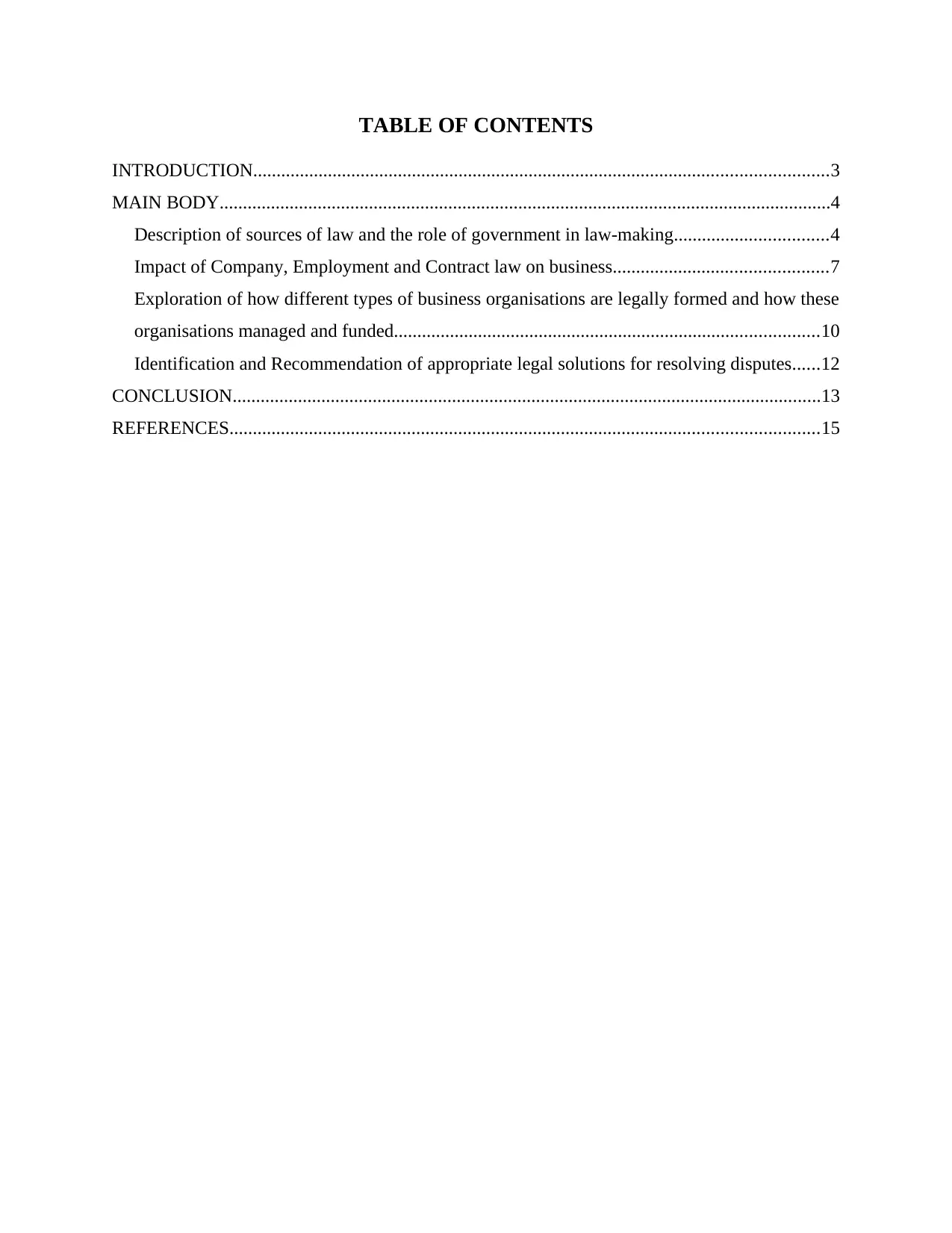
TABLE OF CONTENTS
INTRODUCTION...........................................................................................................................3
MAIN BODY...................................................................................................................................4
Description of sources of law and the role of government in law-making.................................4
Impact of Company, Employment and Contract law on business..............................................7
Exploration of how different types of business organisations are legally formed and how these
organisations managed and funded...........................................................................................10
Identification and Recommendation of appropriate legal solutions for resolving disputes......12
CONCLUSION..............................................................................................................................13
REFERENCES..............................................................................................................................15
INTRODUCTION...........................................................................................................................3
MAIN BODY...................................................................................................................................4
Description of sources of law and the role of government in law-making.................................4
Impact of Company, Employment and Contract law on business..............................................7
Exploration of how different types of business organisations are legally formed and how these
organisations managed and funded...........................................................................................10
Identification and Recommendation of appropriate legal solutions for resolving disputes......12
CONCLUSION..............................................................................................................................13
REFERENCES..............................................................................................................................15
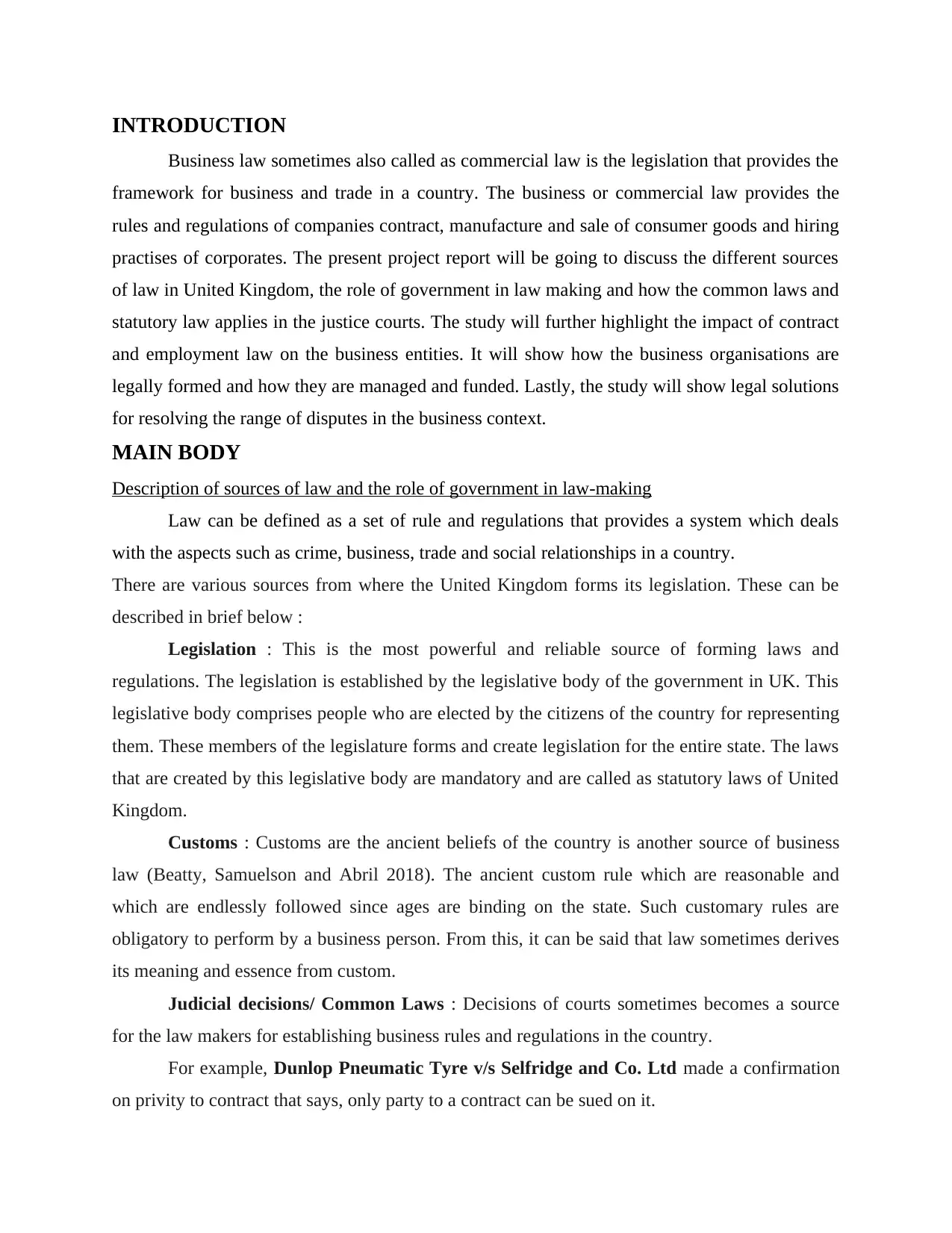
INTRODUCTION
Business law sometimes also called as commercial law is the legislation that provides the
framework for business and trade in a country. The business or commercial law provides the
rules and regulations of companies contract, manufacture and sale of consumer goods and hiring
practises of corporates. The present project report will be going to discuss the different sources
of law in United Kingdom, the role of government in law making and how the common laws and
statutory law applies in the justice courts. The study will further highlight the impact of contract
and employment law on the business entities. It will show how the business organisations are
legally formed and how they are managed and funded. Lastly, the study will show legal solutions
for resolving the range of disputes in the business context.
MAIN BODY
Description of sources of law and the role of government in law-making
Law can be defined as a set of rule and regulations that provides a system which deals
with the aspects such as crime, business, trade and social relationships in a country.
There are various sources from where the United Kingdom forms its legislation. These can be
described in brief below :
Legislation : This is the most powerful and reliable source of forming laws and
regulations. The legislation is established by the legislative body of the government in UK. This
legislative body comprises people who are elected by the citizens of the country for representing
them. These members of the legislature forms and create legislation for the entire state. The laws
that are created by this legislative body are mandatory and are called as statutory laws of United
Kingdom.
Customs : Customs are the ancient beliefs of the country is another source of business
law (Beatty, Samuelson and Abril 2018). The ancient custom rule which are reasonable and
which are endlessly followed since ages are binding on the state. Such customary rules are
obligatory to perform by a business person. From this, it can be said that law sometimes derives
its meaning and essence from custom.
Judicial decisions/ Common Laws : Decisions of courts sometimes becomes a source
for the law makers for establishing business rules and regulations in the country.
For example, Dunlop Pneumatic Tyre v/s Selfridge and Co. Ltd made a confirmation
on privity to contract that says, only party to a contract can be sued on it.
Business law sometimes also called as commercial law is the legislation that provides the
framework for business and trade in a country. The business or commercial law provides the
rules and regulations of companies contract, manufacture and sale of consumer goods and hiring
practises of corporates. The present project report will be going to discuss the different sources
of law in United Kingdom, the role of government in law making and how the common laws and
statutory law applies in the justice courts. The study will further highlight the impact of contract
and employment law on the business entities. It will show how the business organisations are
legally formed and how they are managed and funded. Lastly, the study will show legal solutions
for resolving the range of disputes in the business context.
MAIN BODY
Description of sources of law and the role of government in law-making
Law can be defined as a set of rule and regulations that provides a system which deals
with the aspects such as crime, business, trade and social relationships in a country.
There are various sources from where the United Kingdom forms its legislation. These can be
described in brief below :
Legislation : This is the most powerful and reliable source of forming laws and
regulations. The legislation is established by the legislative body of the government in UK. This
legislative body comprises people who are elected by the citizens of the country for representing
them. These members of the legislature forms and create legislation for the entire state. The laws
that are created by this legislative body are mandatory and are called as statutory laws of United
Kingdom.
Customs : Customs are the ancient beliefs of the country is another source of business
law (Beatty, Samuelson and Abril 2018). The ancient custom rule which are reasonable and
which are endlessly followed since ages are binding on the state. Such customary rules are
obligatory to perform by a business person. From this, it can be said that law sometimes derives
its meaning and essence from custom.
Judicial decisions/ Common Laws : Decisions of courts sometimes becomes a source
for the law makers for establishing business rules and regulations in the country.
For example, Dunlop Pneumatic Tyre v/s Selfridge and Co. Ltd made a confirmation
on privity to contract that says, only party to a contract can be sued on it.
⊘ This is a preview!⊘
Do you want full access?
Subscribe today to unlock all pages.

Trusted by 1+ million students worldwide
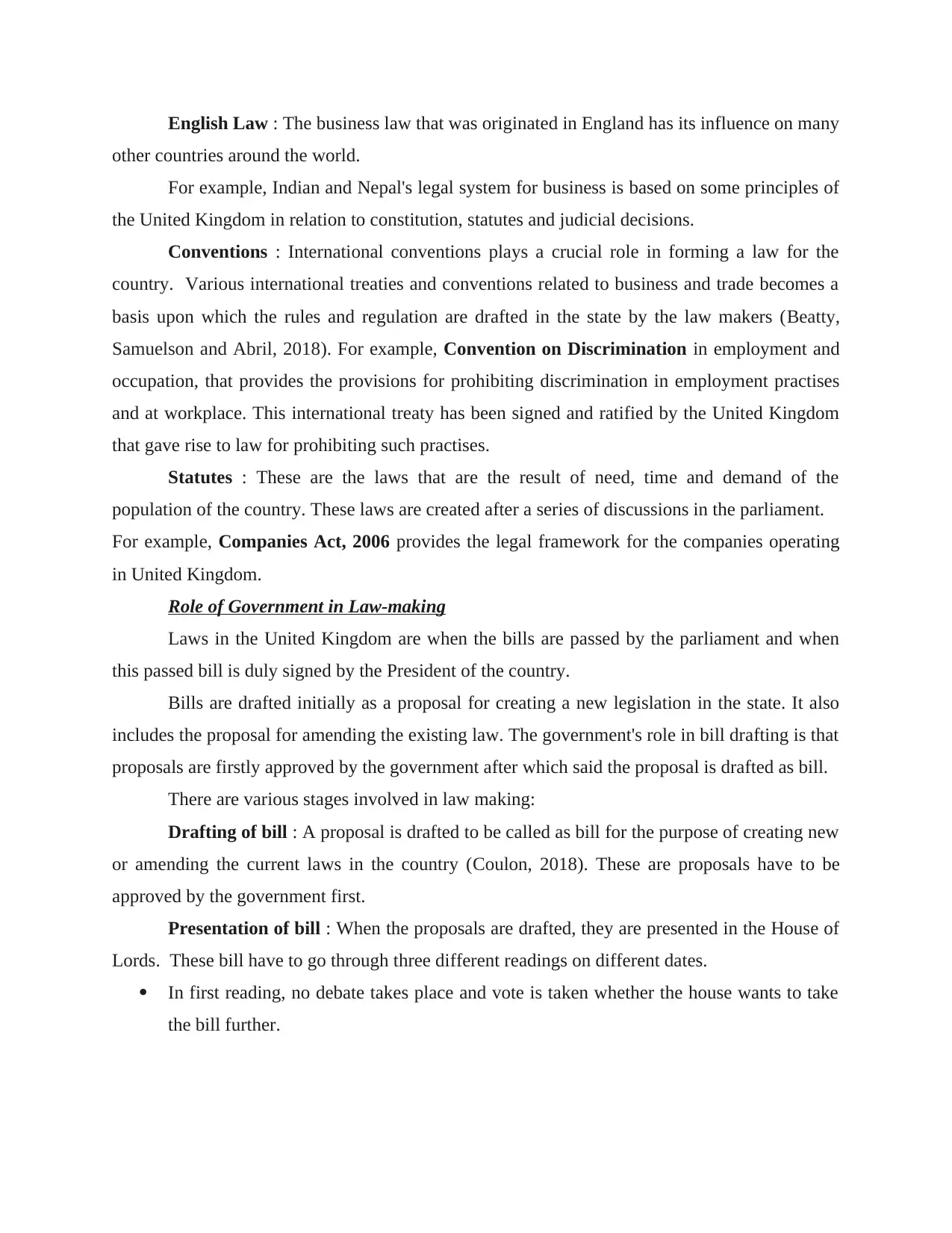
English Law : The business law that was originated in England has its influence on many
other countries around the world.
For example, Indian and Nepal's legal system for business is based on some principles of
the United Kingdom in relation to constitution, statutes and judicial decisions.
Conventions : International conventions plays a crucial role in forming a law for the
country. Various international treaties and conventions related to business and trade becomes a
basis upon which the rules and regulation are drafted in the state by the law makers (Beatty,
Samuelson and Abril, 2018). For example, Convention on Discrimination in employment and
occupation, that provides the provisions for prohibiting discrimination in employment practises
and at workplace. This international treaty has been signed and ratified by the United Kingdom
that gave rise to law for prohibiting such practises.
Statutes : These are the laws that are the result of need, time and demand of the
population of the country. These laws are created after a series of discussions in the parliament.
For example, Companies Act, 2006 provides the legal framework for the companies operating
in United Kingdom.
Role of Government in Law-making
Laws in the United Kingdom are when the bills are passed by the parliament and when
this passed bill is duly signed by the President of the country.
Bills are drafted initially as a proposal for creating a new legislation in the state. It also
includes the proposal for amending the existing law. The government's role in bill drafting is that
proposals are firstly approved by the government after which said the proposal is drafted as bill.
There are various stages involved in law making:
Drafting of bill : A proposal is drafted to be called as bill for the purpose of creating new
or amending the current laws in the country (Coulon, 2018). These are proposals have to be
approved by the government first.
Presentation of bill : When the proposals are drafted, they are presented in the House of
Lords. These bill have to go through three different readings on different dates.
In first reading, no debate takes place and vote is taken whether the house wants to take
the bill further.
other countries around the world.
For example, Indian and Nepal's legal system for business is based on some principles of
the United Kingdom in relation to constitution, statutes and judicial decisions.
Conventions : International conventions plays a crucial role in forming a law for the
country. Various international treaties and conventions related to business and trade becomes a
basis upon which the rules and regulation are drafted in the state by the law makers (Beatty,
Samuelson and Abril, 2018). For example, Convention on Discrimination in employment and
occupation, that provides the provisions for prohibiting discrimination in employment practises
and at workplace. This international treaty has been signed and ratified by the United Kingdom
that gave rise to law for prohibiting such practises.
Statutes : These are the laws that are the result of need, time and demand of the
population of the country. These laws are created after a series of discussions in the parliament.
For example, Companies Act, 2006 provides the legal framework for the companies operating
in United Kingdom.
Role of Government in Law-making
Laws in the United Kingdom are when the bills are passed by the parliament and when
this passed bill is duly signed by the President of the country.
Bills are drafted initially as a proposal for creating a new legislation in the state. It also
includes the proposal for amending the existing law. The government's role in bill drafting is that
proposals are firstly approved by the government after which said the proposal is drafted as bill.
There are various stages involved in law making:
Drafting of bill : A proposal is drafted to be called as bill for the purpose of creating new
or amending the current laws in the country (Coulon, 2018). These are proposals have to be
approved by the government first.
Presentation of bill : When the proposals are drafted, they are presented in the House of
Lords. These bill have to go through three different readings on different dates.
In first reading, no debate takes place and vote is taken whether the house wants to take
the bill further.
Paraphrase This Document
Need a fresh take? Get an instant paraphrase of this document with our AI Paraphraser
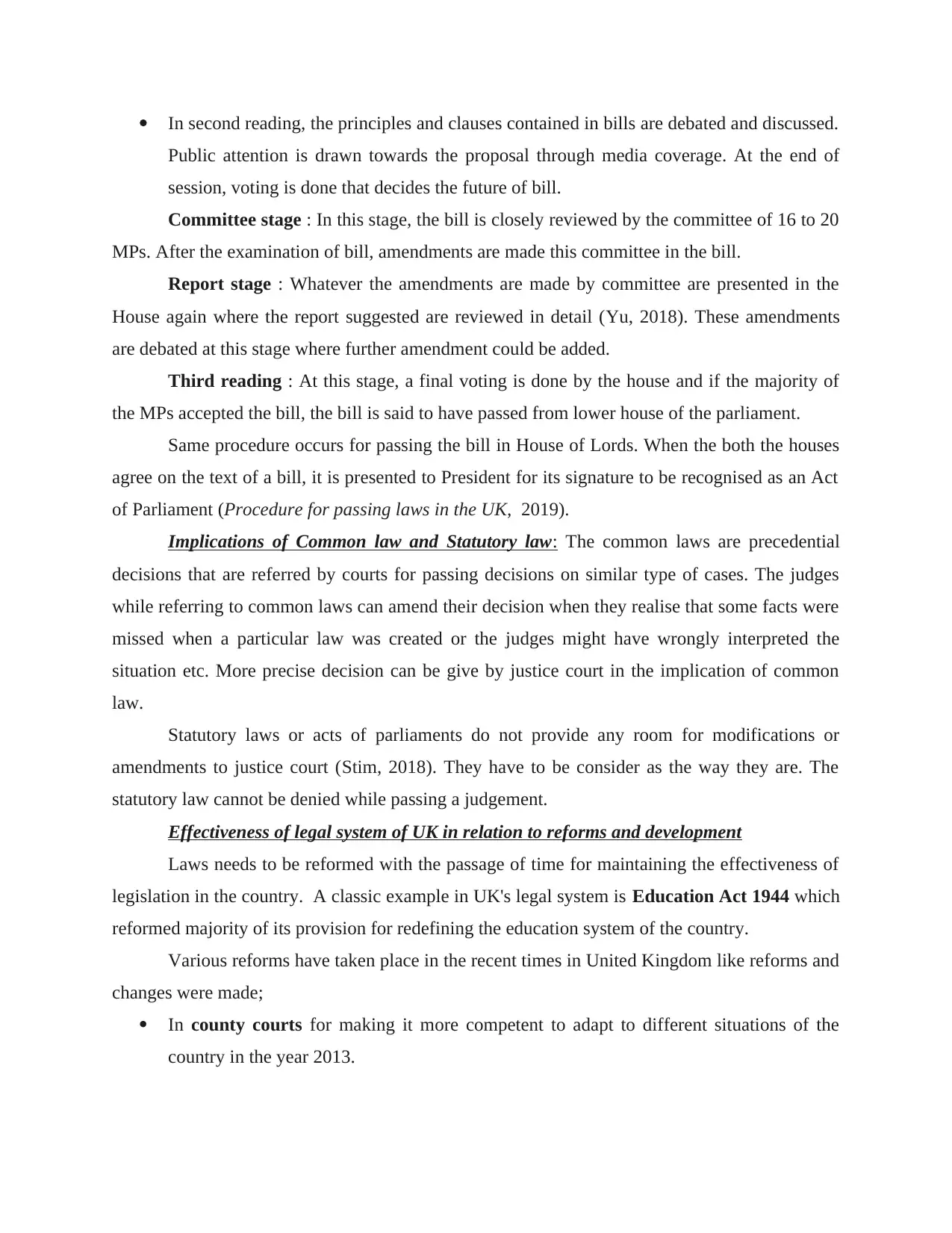
In second reading, the principles and clauses contained in bills are debated and discussed.
Public attention is drawn towards the proposal through media coverage. At the end of
session, voting is done that decides the future of bill.
Committee stage : In this stage, the bill is closely reviewed by the committee of 16 to 20
MPs. After the examination of bill, amendments are made this committee in the bill.
Report stage : Whatever the amendments are made by committee are presented in the
House again where the report suggested are reviewed in detail (Yu, 2018). These amendments
are debated at this stage where further amendment could be added.
Third reading : At this stage, a final voting is done by the house and if the majority of
the MPs accepted the bill, the bill is said to have passed from lower house of the parliament.
Same procedure occurs for passing the bill in House of Lords. When the both the houses
agree on the text of a bill, it is presented to President for its signature to be recognised as an Act
of Parliament (Procedure for passing laws in the UK, 2019).
Implications of Common law and Statutory law: The common laws are precedential
decisions that are referred by courts for passing decisions on similar type of cases. The judges
while referring to common laws can amend their decision when they realise that some facts were
missed when a particular law was created or the judges might have wrongly interpreted the
situation etc. More precise decision can be give by justice court in the implication of common
law.
Statutory laws or acts of parliaments do not provide any room for modifications or
amendments to justice court (Stim, 2018). They have to be consider as the way they are. The
statutory law cannot be denied while passing a judgement.
Effectiveness of legal system of UK in relation to reforms and development
Laws needs to be reformed with the passage of time for maintaining the effectiveness of
legislation in the country. A classic example in UK's legal system is Education Act 1944 which
reformed majority of its provision for redefining the education system of the country.
Various reforms have taken place in the recent times in United Kingdom like reforms and
changes were made;
In county courts for making it more competent to adapt to different situations of the
country in the year 2013.
Public attention is drawn towards the proposal through media coverage. At the end of
session, voting is done that decides the future of bill.
Committee stage : In this stage, the bill is closely reviewed by the committee of 16 to 20
MPs. After the examination of bill, amendments are made this committee in the bill.
Report stage : Whatever the amendments are made by committee are presented in the
House again where the report suggested are reviewed in detail (Yu, 2018). These amendments
are debated at this stage where further amendment could be added.
Third reading : At this stage, a final voting is done by the house and if the majority of
the MPs accepted the bill, the bill is said to have passed from lower house of the parliament.
Same procedure occurs for passing the bill in House of Lords. When the both the houses
agree on the text of a bill, it is presented to President for its signature to be recognised as an Act
of Parliament (Procedure for passing laws in the UK, 2019).
Implications of Common law and Statutory law: The common laws are precedential
decisions that are referred by courts for passing decisions on similar type of cases. The judges
while referring to common laws can amend their decision when they realise that some facts were
missed when a particular law was created or the judges might have wrongly interpreted the
situation etc. More precise decision can be give by justice court in the implication of common
law.
Statutory laws or acts of parliaments do not provide any room for modifications or
amendments to justice court (Stim, 2018). They have to be consider as the way they are. The
statutory law cannot be denied while passing a judgement.
Effectiveness of legal system of UK in relation to reforms and development
Laws needs to be reformed with the passage of time for maintaining the effectiveness of
legislation in the country. A classic example in UK's legal system is Education Act 1944 which
reformed majority of its provision for redefining the education system of the country.
Various reforms have taken place in the recent times in United Kingdom like reforms and
changes were made;
In county courts for making it more competent to adapt to different situations of the
country in the year 2013.
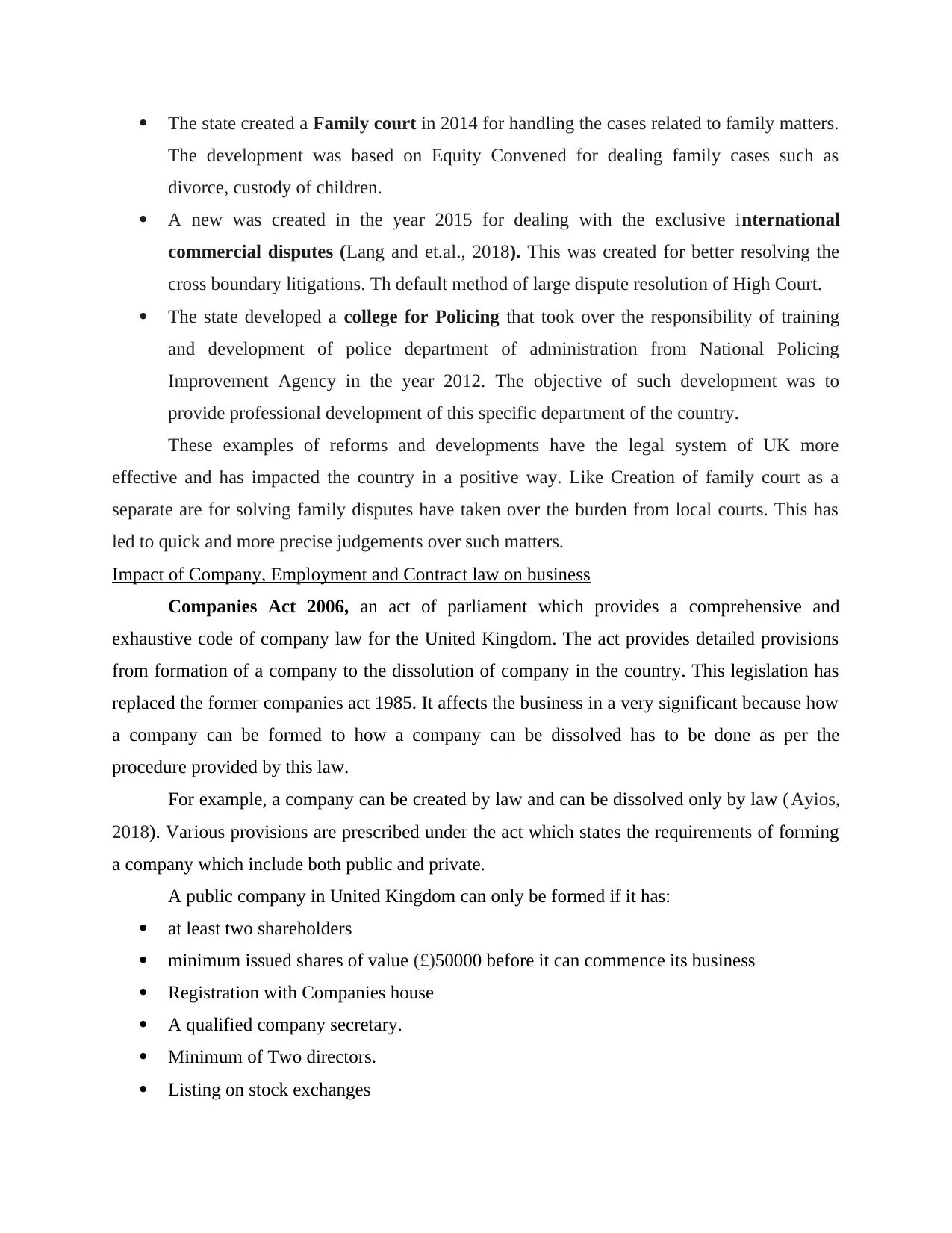
The state created a Family court in 2014 for handling the cases related to family matters.
The development was based on Equity Convened for dealing family cases such as
divorce, custody of children.
A new was created in the year 2015 for dealing with the exclusive international
commercial disputes (Lang and et.al., 2018). This was created for better resolving the
cross boundary litigations. Th default method of large dispute resolution of High Court.
The state developed a college for Policing that took over the responsibility of training
and development of police department of administration from National Policing
Improvement Agency in the year 2012. The objective of such development was to
provide professional development of this specific department of the country.
These examples of reforms and developments have the legal system of UK more
effective and has impacted the country in a positive way. Like Creation of family court as a
separate are for solving family disputes have taken over the burden from local courts. This has
led to quick and more precise judgements over such matters.
Impact of Company, Employment and Contract law on business
Companies Act 2006, an act of parliament which provides a comprehensive and
exhaustive code of company law for the United Kingdom. The act provides detailed provisions
from formation of a company to the dissolution of company in the country. This legislation has
replaced the former companies act 1985. It affects the business in a very significant because how
a company can be formed to how a company can be dissolved has to be done as per the
procedure provided by this law.
For example, a company can be created by law and can be dissolved only by law ( Ayios,
2018). Various provisions are prescribed under the act which states the requirements of forming
a company which include both public and private.
A public company in United Kingdom can only be formed if it has:
at least two shareholders
minimum issued shares of value (£)50000 before it can commence its business
Registration with Companies house
A qualified company secretary.
Minimum of Two directors.
Listing on stock exchanges
The development was based on Equity Convened for dealing family cases such as
divorce, custody of children.
A new was created in the year 2015 for dealing with the exclusive international
commercial disputes (Lang and et.al., 2018). This was created for better resolving the
cross boundary litigations. Th default method of large dispute resolution of High Court.
The state developed a college for Policing that took over the responsibility of training
and development of police department of administration from National Policing
Improvement Agency in the year 2012. The objective of such development was to
provide professional development of this specific department of the country.
These examples of reforms and developments have the legal system of UK more
effective and has impacted the country in a positive way. Like Creation of family court as a
separate are for solving family disputes have taken over the burden from local courts. This has
led to quick and more precise judgements over such matters.
Impact of Company, Employment and Contract law on business
Companies Act 2006, an act of parliament which provides a comprehensive and
exhaustive code of company law for the United Kingdom. The act provides detailed provisions
from formation of a company to the dissolution of company in the country. This legislation has
replaced the former companies act 1985. It affects the business in a very significant because how
a company can be formed to how a company can be dissolved has to be done as per the
procedure provided by this law.
For example, a company can be created by law and can be dissolved only by law ( Ayios,
2018). Various provisions are prescribed under the act which states the requirements of forming
a company which include both public and private.
A public company in United Kingdom can only be formed if it has:
at least two shareholders
minimum issued shares of value (£)50000 before it can commence its business
Registration with Companies house
A qualified company secretary.
Minimum of Two directors.
Listing on stock exchanges
⊘ This is a preview!⊘
Do you want full access?
Subscribe today to unlock all pages.

Trusted by 1+ million students worldwide
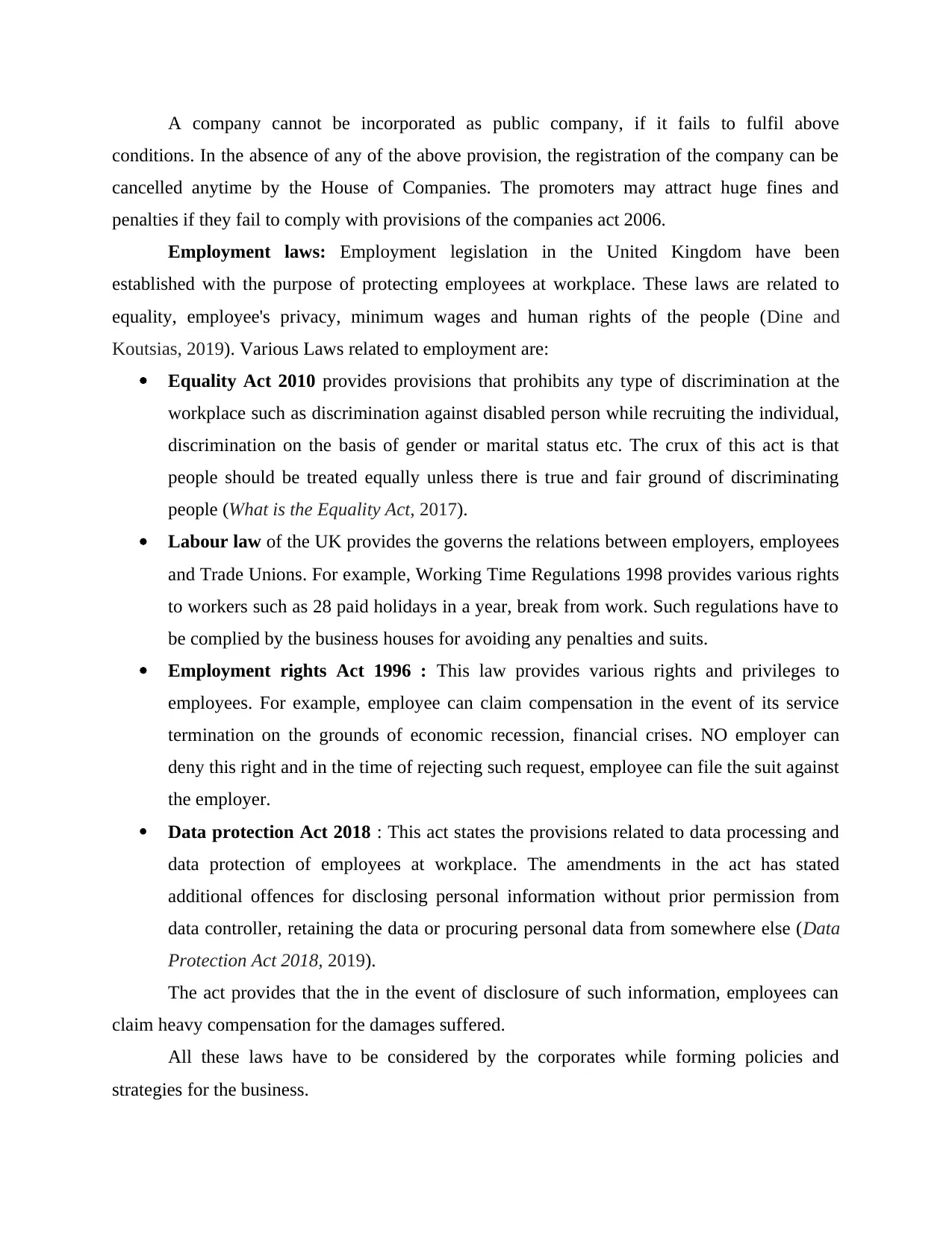
A company cannot be incorporated as public company, if it fails to fulfil above
conditions. In the absence of any of the above provision, the registration of the company can be
cancelled anytime by the House of Companies. The promoters may attract huge fines and
penalties if they fail to comply with provisions of the companies act 2006.
Employment laws: Employment legislation in the United Kingdom have been
established with the purpose of protecting employees at workplace. These laws are related to
equality, employee's privacy, minimum wages and human rights of the people (Dine and
Koutsias, 2019). Various Laws related to employment are:
Equality Act 2010 provides provisions that prohibits any type of discrimination at the
workplace such as discrimination against disabled person while recruiting the individual,
discrimination on the basis of gender or marital status etc. The crux of this act is that
people should be treated equally unless there is true and fair ground of discriminating
people (What is the Equality Act, 2017).
Labour law of the UK provides the governs the relations between employers, employees
and Trade Unions. For example, Working Time Regulations 1998 provides various rights
to workers such as 28 paid holidays in a year, break from work. Such regulations have to
be complied by the business houses for avoiding any penalties and suits.
Employment rights Act 1996 : This law provides various rights and privileges to
employees. For example, employee can claim compensation in the event of its service
termination on the grounds of economic recession, financial crises. NO employer can
deny this right and in the time of rejecting such request, employee can file the suit against
the employer.
Data protection Act 2018 : This act states the provisions related to data processing and
data protection of employees at workplace. The amendments in the act has stated
additional offences for disclosing personal information without prior permission from
data controller, retaining the data or procuring personal data from somewhere else (Data
Protection Act 2018, 2019).
The act provides that the in the event of disclosure of such information, employees can
claim heavy compensation for the damages suffered.
All these laws have to be considered by the corporates while forming policies and
strategies for the business.
conditions. In the absence of any of the above provision, the registration of the company can be
cancelled anytime by the House of Companies. The promoters may attract huge fines and
penalties if they fail to comply with provisions of the companies act 2006.
Employment laws: Employment legislation in the United Kingdom have been
established with the purpose of protecting employees at workplace. These laws are related to
equality, employee's privacy, minimum wages and human rights of the people (Dine and
Koutsias, 2019). Various Laws related to employment are:
Equality Act 2010 provides provisions that prohibits any type of discrimination at the
workplace such as discrimination against disabled person while recruiting the individual,
discrimination on the basis of gender or marital status etc. The crux of this act is that
people should be treated equally unless there is true and fair ground of discriminating
people (What is the Equality Act, 2017).
Labour law of the UK provides the governs the relations between employers, employees
and Trade Unions. For example, Working Time Regulations 1998 provides various rights
to workers such as 28 paid holidays in a year, break from work. Such regulations have to
be complied by the business houses for avoiding any penalties and suits.
Employment rights Act 1996 : This law provides various rights and privileges to
employees. For example, employee can claim compensation in the event of its service
termination on the grounds of economic recession, financial crises. NO employer can
deny this right and in the time of rejecting such request, employee can file the suit against
the employer.
Data protection Act 2018 : This act states the provisions related to data processing and
data protection of employees at workplace. The amendments in the act has stated
additional offences for disclosing personal information without prior permission from
data controller, retaining the data or procuring personal data from somewhere else (Data
Protection Act 2018, 2019).
The act provides that the in the event of disclosure of such information, employees can
claim heavy compensation for the damages suffered.
All these laws have to be considered by the corporates while forming policies and
strategies for the business.
Paraphrase This Document
Need a fresh take? Get an instant paraphrase of this document with our AI Paraphraser
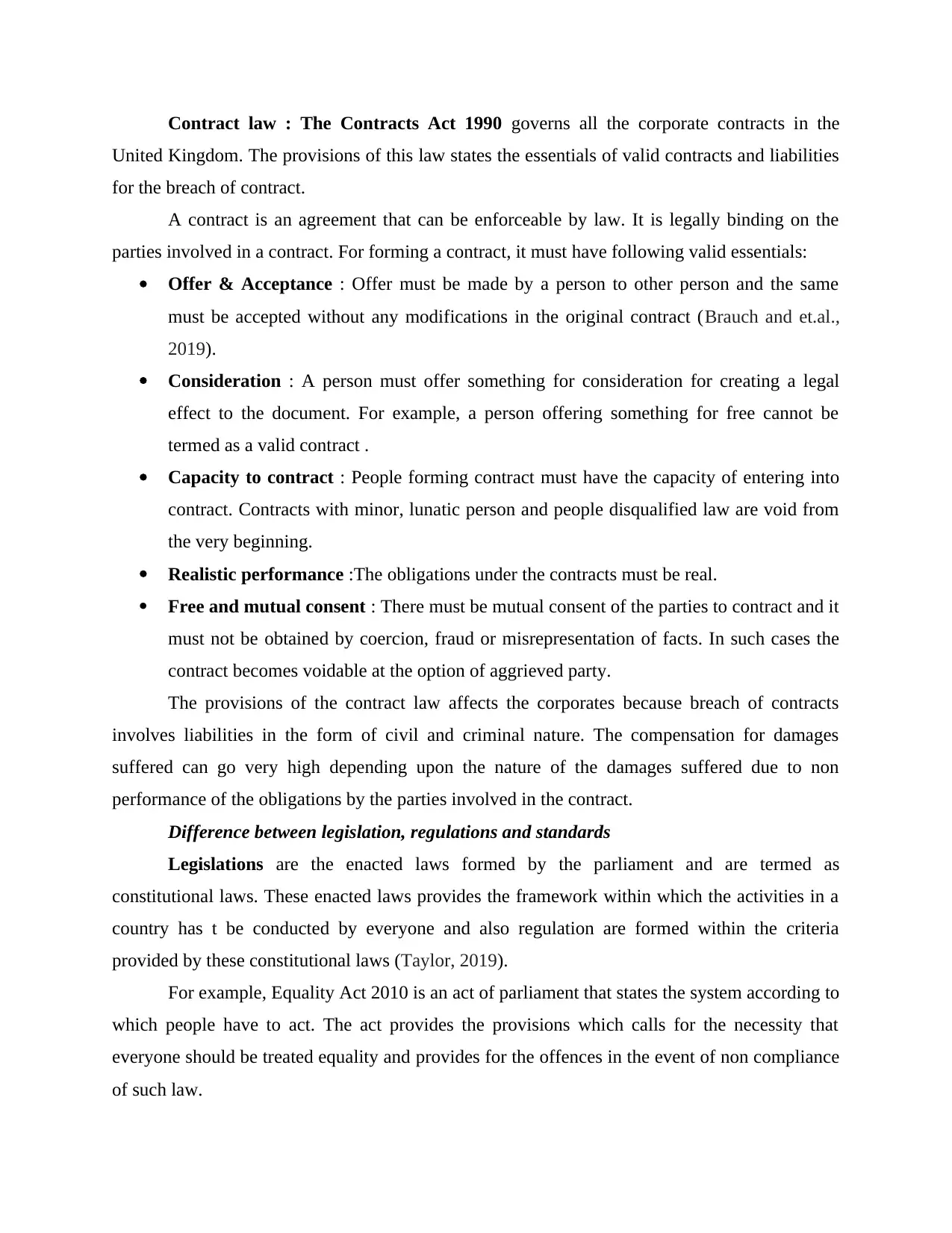
Contract law : The Contracts Act 1990 governs all the corporate contracts in the
United Kingdom. The provisions of this law states the essentials of valid contracts and liabilities
for the breach of contract.
A contract is an agreement that can be enforceable by law. It is legally binding on the
parties involved in a contract. For forming a contract, it must have following valid essentials:
Offer & Acceptance : Offer must be made by a person to other person and the same
must be accepted without any modifications in the original contract (Brauch and et.al.,
2019).
Consideration : A person must offer something for consideration for creating a legal
effect to the document. For example, a person offering something for free cannot be
termed as a valid contract .
Capacity to contract : People forming contract must have the capacity of entering into
contract. Contracts with minor, lunatic person and people disqualified law are void from
the very beginning.
Realistic performance :The obligations under the contracts must be real.
Free and mutual consent : There must be mutual consent of the parties to contract and it
must not be obtained by coercion, fraud or misrepresentation of facts. In such cases the
contract becomes voidable at the option of aggrieved party.
The provisions of the contract law affects the corporates because breach of contracts
involves liabilities in the form of civil and criminal nature. The compensation for damages
suffered can go very high depending upon the nature of the damages suffered due to non
performance of the obligations by the parties involved in the contract.
Difference between legislation, regulations and standards
Legislations are the enacted laws formed by the parliament and are termed as
constitutional laws. These enacted laws provides the framework within which the activities in a
country has t be conducted by everyone and also regulation are formed within the criteria
provided by these constitutional laws (Taylor, 2019).
For example, Equality Act 2010 is an act of parliament that states the system according to
which people have to act. The act provides the provisions which calls for the necessity that
everyone should be treated equality and provides for the offences in the event of non compliance
of such law.
United Kingdom. The provisions of this law states the essentials of valid contracts and liabilities
for the breach of contract.
A contract is an agreement that can be enforceable by law. It is legally binding on the
parties involved in a contract. For forming a contract, it must have following valid essentials:
Offer & Acceptance : Offer must be made by a person to other person and the same
must be accepted without any modifications in the original contract (Brauch and et.al.,
2019).
Consideration : A person must offer something for consideration for creating a legal
effect to the document. For example, a person offering something for free cannot be
termed as a valid contract .
Capacity to contract : People forming contract must have the capacity of entering into
contract. Contracts with minor, lunatic person and people disqualified law are void from
the very beginning.
Realistic performance :The obligations under the contracts must be real.
Free and mutual consent : There must be mutual consent of the parties to contract and it
must not be obtained by coercion, fraud or misrepresentation of facts. In such cases the
contract becomes voidable at the option of aggrieved party.
The provisions of the contract law affects the corporates because breach of contracts
involves liabilities in the form of civil and criminal nature. The compensation for damages
suffered can go very high depending upon the nature of the damages suffered due to non
performance of the obligations by the parties involved in the contract.
Difference between legislation, regulations and standards
Legislations are the enacted laws formed by the parliament and are termed as
constitutional laws. These enacted laws provides the framework within which the activities in a
country has t be conducted by everyone and also regulation are formed within the criteria
provided by these constitutional laws (Taylor, 2019).
For example, Equality Act 2010 is an act of parliament that states the system according to
which people have to act. The act provides the provisions which calls for the necessity that
everyone should be treated equality and provides for the offences in the event of non compliance
of such law.
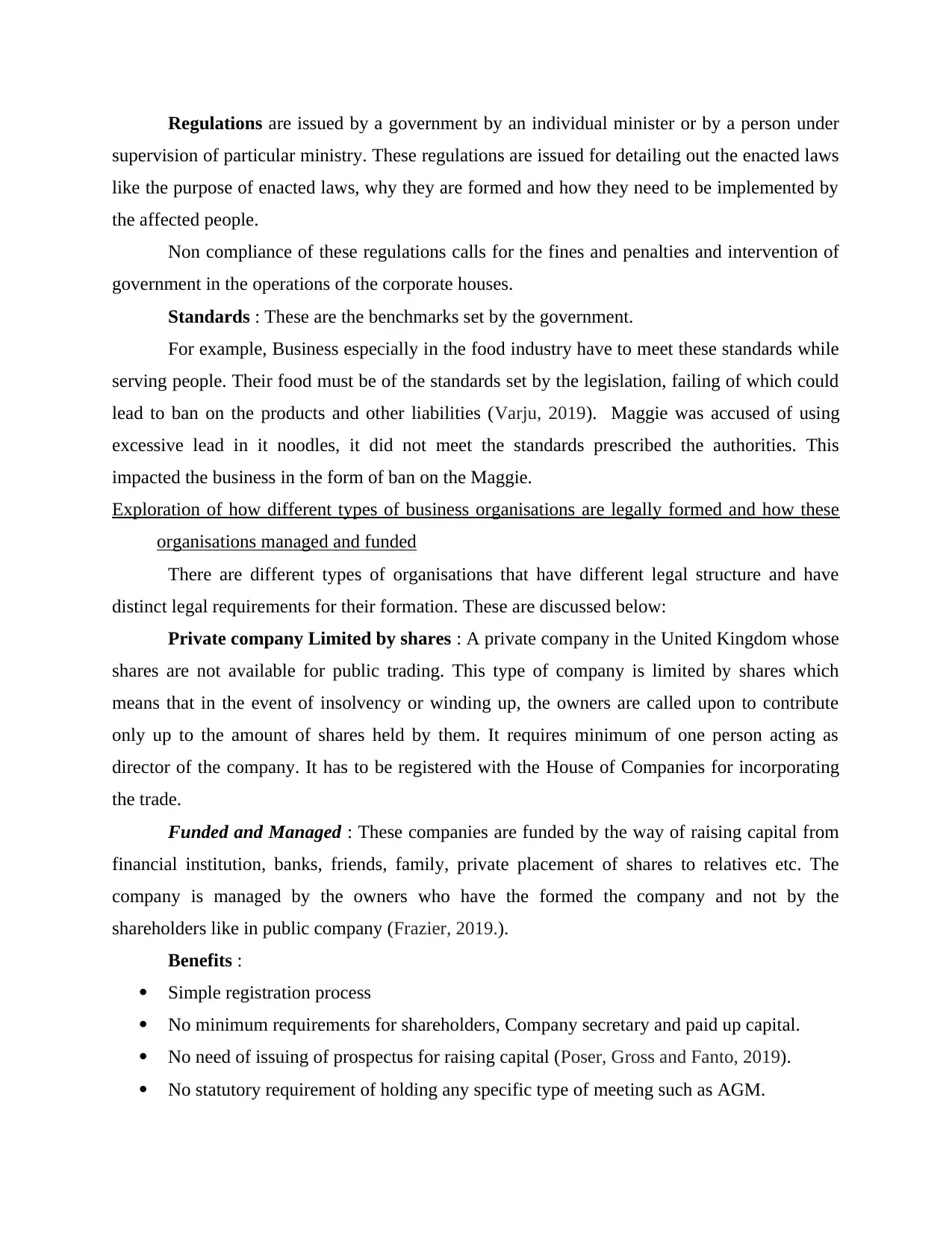
Regulations are issued by a government by an individual minister or by a person under
supervision of particular ministry. These regulations are issued for detailing out the enacted laws
like the purpose of enacted laws, why they are formed and how they need to be implemented by
the affected people.
Non compliance of these regulations calls for the fines and penalties and intervention of
government in the operations of the corporate houses.
Standards : These are the benchmarks set by the government.
For example, Business especially in the food industry have to meet these standards while
serving people. Their food must be of the standards set by the legislation, failing of which could
lead to ban on the products and other liabilities (Varju, 2019). Maggie was accused of using
excessive lead in it noodles, it did not meet the standards prescribed the authorities. This
impacted the business in the form of ban on the Maggie.
Exploration of how different types of business organisations are legally formed and how these
organisations managed and funded
There are different types of organisations that have different legal structure and have
distinct legal requirements for their formation. These are discussed below:
Private company Limited by shares : A private company in the United Kingdom whose
shares are not available for public trading. This type of company is limited by shares which
means that in the event of insolvency or winding up, the owners are called upon to contribute
only up to the amount of shares held by them. It requires minimum of one person acting as
director of the company. It has to be registered with the House of Companies for incorporating
the trade.
Funded and Managed : These companies are funded by the way of raising capital from
financial institution, banks, friends, family, private placement of shares to relatives etc. The
company is managed by the owners who have the formed the company and not by the
shareholders like in public company (Frazier, 2019.).
Benefits :
Simple registration process
No minimum requirements for shareholders, Company secretary and paid up capital.
No need of issuing of prospectus for raising capital (Poser, Gross and Fanto, 2019).
No statutory requirement of holding any specific type of meeting such as AGM.
supervision of particular ministry. These regulations are issued for detailing out the enacted laws
like the purpose of enacted laws, why they are formed and how they need to be implemented by
the affected people.
Non compliance of these regulations calls for the fines and penalties and intervention of
government in the operations of the corporate houses.
Standards : These are the benchmarks set by the government.
For example, Business especially in the food industry have to meet these standards while
serving people. Their food must be of the standards set by the legislation, failing of which could
lead to ban on the products and other liabilities (Varju, 2019). Maggie was accused of using
excessive lead in it noodles, it did not meet the standards prescribed the authorities. This
impacted the business in the form of ban on the Maggie.
Exploration of how different types of business organisations are legally formed and how these
organisations managed and funded
There are different types of organisations that have different legal structure and have
distinct legal requirements for their formation. These are discussed below:
Private company Limited by shares : A private company in the United Kingdom whose
shares are not available for public trading. This type of company is limited by shares which
means that in the event of insolvency or winding up, the owners are called upon to contribute
only up to the amount of shares held by them. It requires minimum of one person acting as
director of the company. It has to be registered with the House of Companies for incorporating
the trade.
Funded and Managed : These companies are funded by the way of raising capital from
financial institution, banks, friends, family, private placement of shares to relatives etc. The
company is managed by the owners who have the formed the company and not by the
shareholders like in public company (Frazier, 2019.).
Benefits :
Simple registration process
No minimum requirements for shareholders, Company secretary and paid up capital.
No need of issuing of prospectus for raising capital (Poser, Gross and Fanto, 2019).
No statutory requirement of holding any specific type of meeting such as AGM.
⊘ This is a preview!⊘
Do you want full access?
Subscribe today to unlock all pages.

Trusted by 1+ million students worldwide
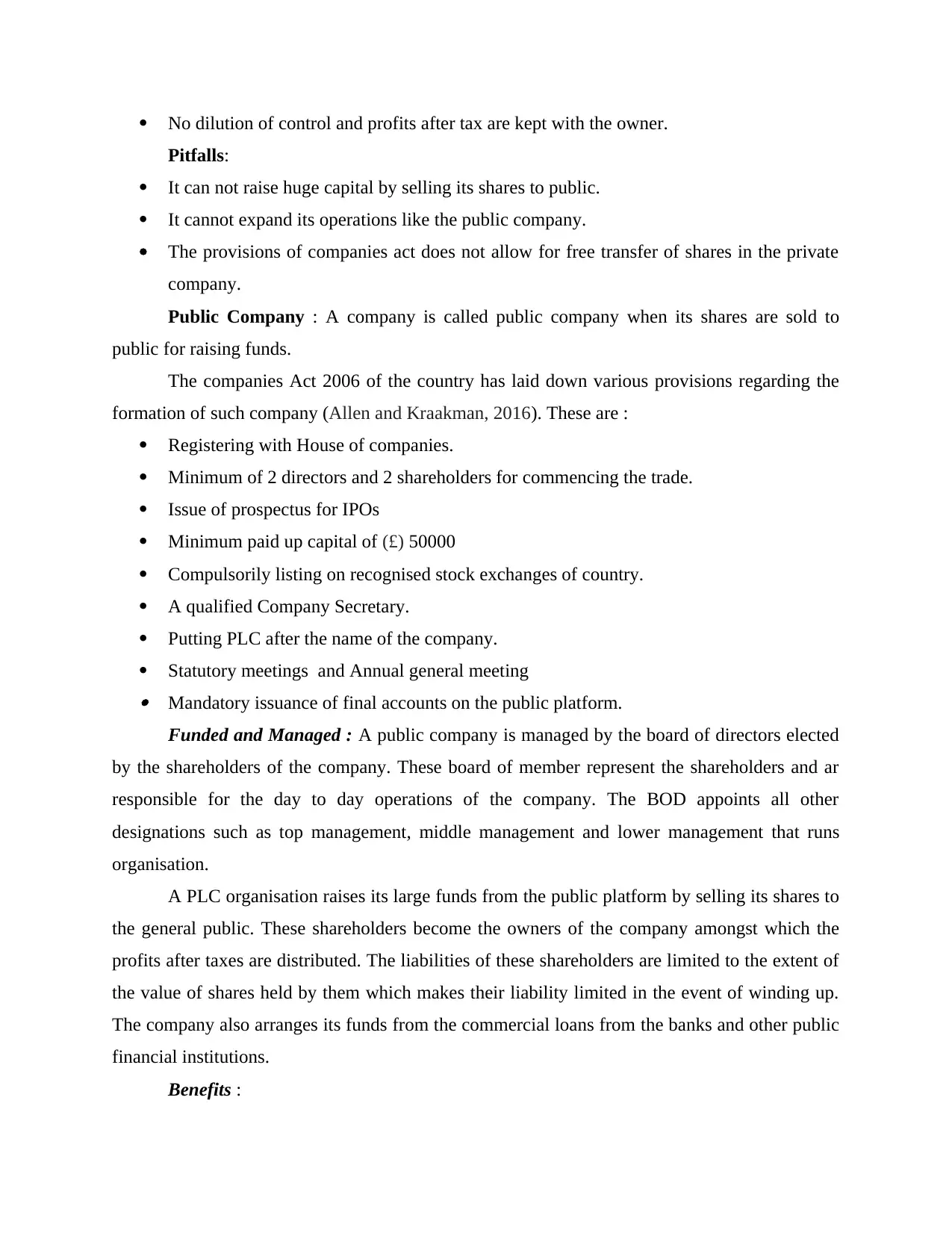
No dilution of control and profits after tax are kept with the owner.
Pitfalls:
It can not raise huge capital by selling its shares to public.
It cannot expand its operations like the public company.
The provisions of companies act does not allow for free transfer of shares in the private
company.
Public Company : A company is called public company when its shares are sold to
public for raising funds.
The companies Act 2006 of the country has laid down various provisions regarding the
formation of such company (Allen and Kraakman, 2016). These are :
Registering with House of companies.
Minimum of 2 directors and 2 shareholders for commencing the trade.
Issue of prospectus for IPOs
Minimum paid up capital of (£) 50000
Compulsorily listing on recognised stock exchanges of country.
A qualified Company Secretary.
Putting PLC after the name of the company.
Statutory meetings and Annual general meeting Mandatory issuance of final accounts on the public platform.
Funded and Managed : A public company is managed by the board of directors elected
by the shareholders of the company. These board of member represent the shareholders and ar
responsible for the day to day operations of the company. The BOD appoints all other
designations such as top management, middle management and lower management that runs
organisation.
A PLC organisation raises its large funds from the public platform by selling its shares to
the general public. These shareholders become the owners of the company amongst which the
profits after taxes are distributed. The liabilities of these shareholders are limited to the extent of
the value of shares held by them which makes their liability limited in the event of winding up.
The company also arranges its funds from the commercial loans from the banks and other public
financial institutions.
Benefits :
Pitfalls:
It can not raise huge capital by selling its shares to public.
It cannot expand its operations like the public company.
The provisions of companies act does not allow for free transfer of shares in the private
company.
Public Company : A company is called public company when its shares are sold to
public for raising funds.
The companies Act 2006 of the country has laid down various provisions regarding the
formation of such company (Allen and Kraakman, 2016). These are :
Registering with House of companies.
Minimum of 2 directors and 2 shareholders for commencing the trade.
Issue of prospectus for IPOs
Minimum paid up capital of (£) 50000
Compulsorily listing on recognised stock exchanges of country.
A qualified Company Secretary.
Putting PLC after the name of the company.
Statutory meetings and Annual general meeting Mandatory issuance of final accounts on the public platform.
Funded and Managed : A public company is managed by the board of directors elected
by the shareholders of the company. These board of member represent the shareholders and ar
responsible for the day to day operations of the company. The BOD appoints all other
designations such as top management, middle management and lower management that runs
organisation.
A PLC organisation raises its large funds from the public platform by selling its shares to
the general public. These shareholders become the owners of the company amongst which the
profits after taxes are distributed. The liabilities of these shareholders are limited to the extent of
the value of shares held by them which makes their liability limited in the event of winding up.
The company also arranges its funds from the commercial loans from the banks and other public
financial institutions.
Benefits :
Paraphrase This Document
Need a fresh take? Get an instant paraphrase of this document with our AI Paraphraser
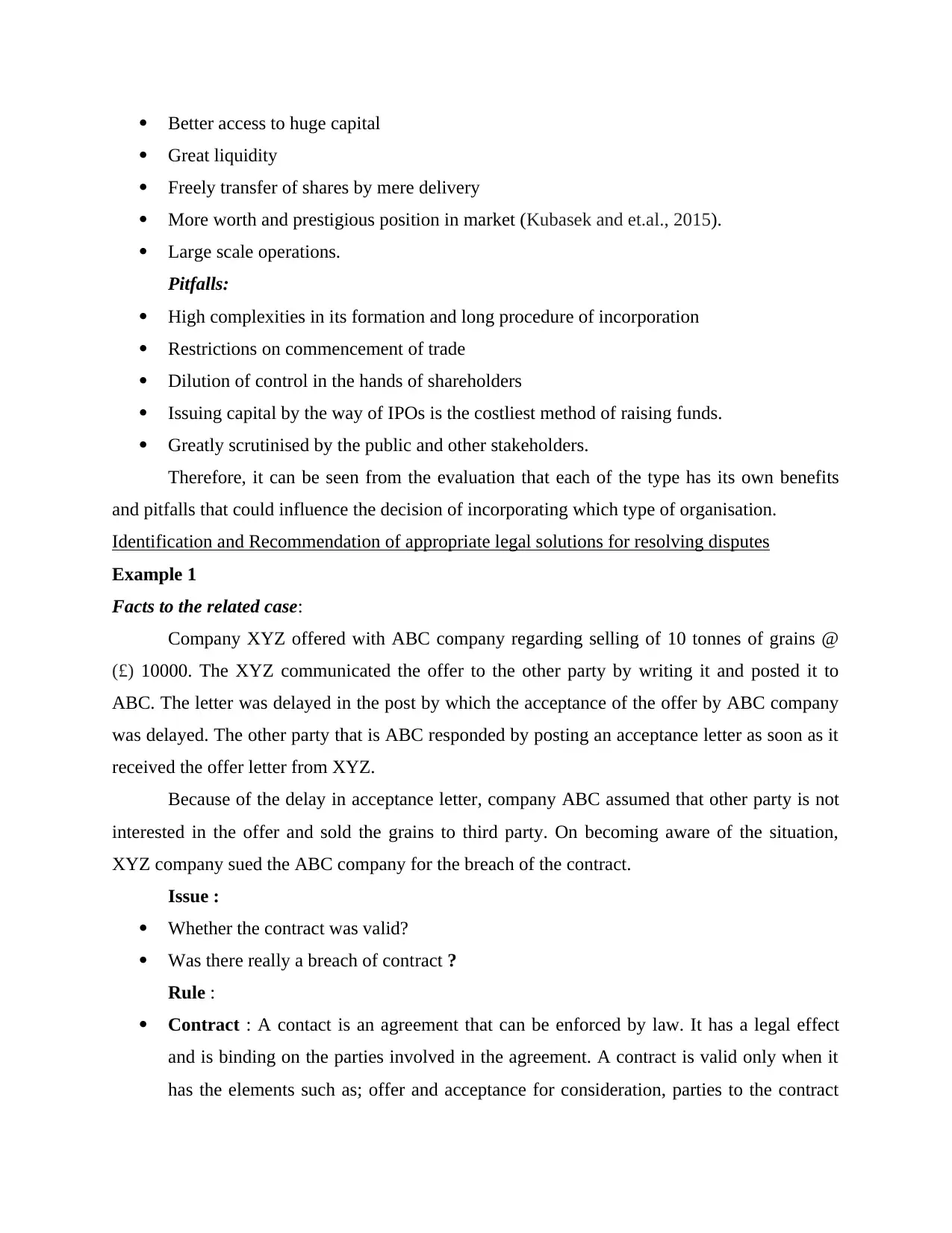
Better access to huge capital
Great liquidity
Freely transfer of shares by mere delivery
More worth and prestigious position in market (Kubasek and et.al., 2015).
Large scale operations.
Pitfalls:
High complexities in its formation and long procedure of incorporation
Restrictions on commencement of trade
Dilution of control in the hands of shareholders
Issuing capital by the way of IPOs is the costliest method of raising funds.
Greatly scrutinised by the public and other stakeholders.
Therefore, it can be seen from the evaluation that each of the type has its own benefits
and pitfalls that could influence the decision of incorporating which type of organisation.
Identification and Recommendation of appropriate legal solutions for resolving disputes
Example 1
Facts to the related case:
Company XYZ offered with ABC company regarding selling of 10 tonnes of grains @
(£) 10000. The XYZ communicated the offer to the other party by writing it and posted it to
ABC. The letter was delayed in the post by which the acceptance of the offer by ABC company
was delayed. The other party that is ABC responded by posting an acceptance letter as soon as it
received the offer letter from XYZ.
Because of the delay in acceptance letter, company ABC assumed that other party is not
interested in the offer and sold the grains to third party. On becoming aware of the situation,
XYZ company sued the ABC company for the breach of the contract.
Issue :
Whether the contract was valid?
Was there really a breach of contract ?
Rule :
Contract : A contact is an agreement that can be enforced by law. It has a legal effect
and is binding on the parties involved in the agreement. A contract is valid only when it
has the elements such as; offer and acceptance for consideration, parties to the contract
Great liquidity
Freely transfer of shares by mere delivery
More worth and prestigious position in market (Kubasek and et.al., 2015).
Large scale operations.
Pitfalls:
High complexities in its formation and long procedure of incorporation
Restrictions on commencement of trade
Dilution of control in the hands of shareholders
Issuing capital by the way of IPOs is the costliest method of raising funds.
Greatly scrutinised by the public and other stakeholders.
Therefore, it can be seen from the evaluation that each of the type has its own benefits
and pitfalls that could influence the decision of incorporating which type of organisation.
Identification and Recommendation of appropriate legal solutions for resolving disputes
Example 1
Facts to the related case:
Company XYZ offered with ABC company regarding selling of 10 tonnes of grains @
(£) 10000. The XYZ communicated the offer to the other party by writing it and posted it to
ABC. The letter was delayed in the post by which the acceptance of the offer by ABC company
was delayed. The other party that is ABC responded by posting an acceptance letter as soon as it
received the offer letter from XYZ.
Because of the delay in acceptance letter, company ABC assumed that other party is not
interested in the offer and sold the grains to third party. On becoming aware of the situation,
XYZ company sued the ABC company for the breach of the contract.
Issue :
Whether the contract was valid?
Was there really a breach of contract ?
Rule :
Contract : A contact is an agreement that can be enforced by law. It has a legal effect
and is binding on the parties involved in the agreement. A contract is valid only when it
has the elements such as; offer and acceptance for consideration, parties to the contract
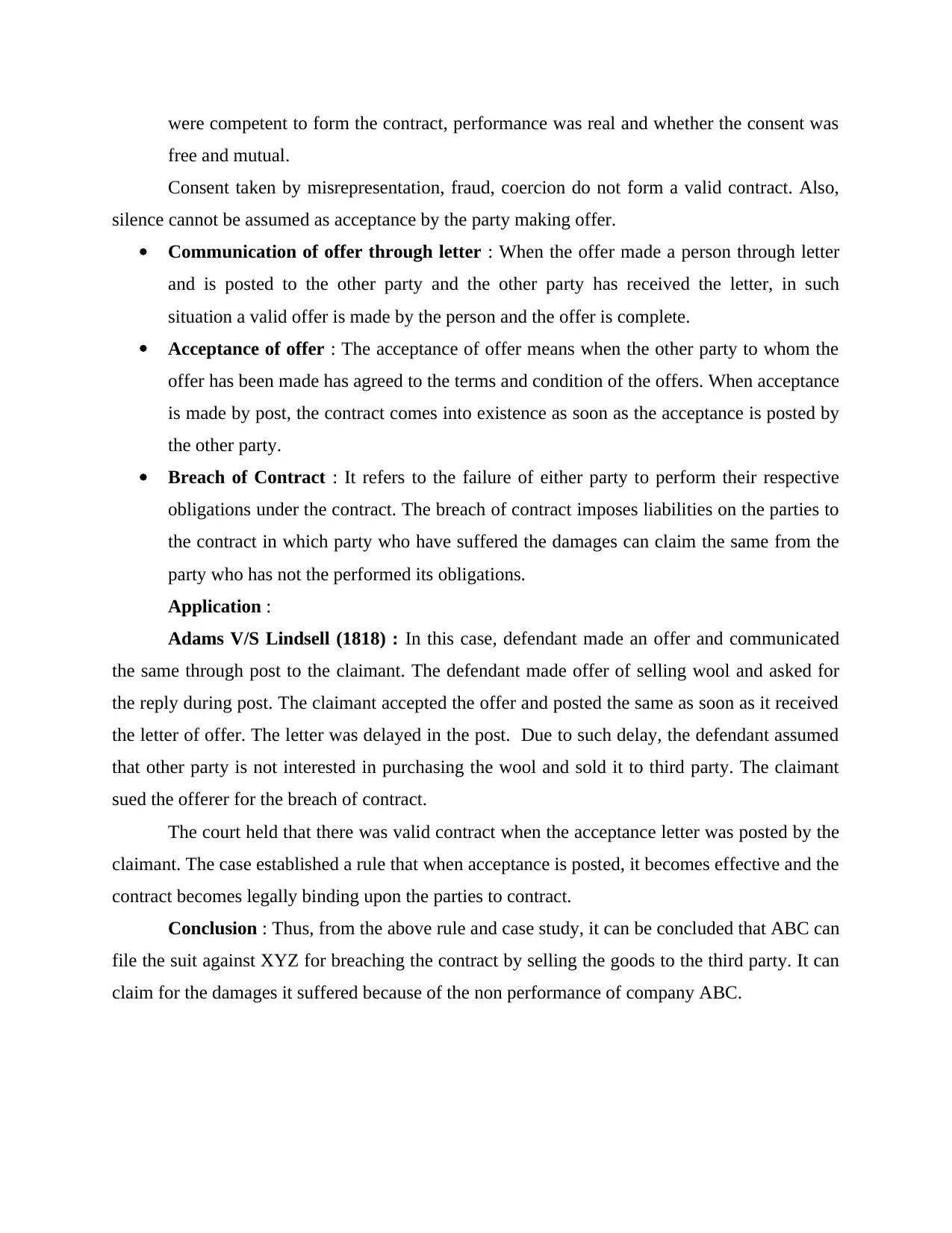
were competent to form the contract, performance was real and whether the consent was
free and mutual.
Consent taken by misrepresentation, fraud, coercion do not form a valid contract. Also,
silence cannot be assumed as acceptance by the party making offer.
Communication of offer through letter : When the offer made a person through letter
and is posted to the other party and the other party has received the letter, in such
situation a valid offer is made by the person and the offer is complete.
Acceptance of offer : The acceptance of offer means when the other party to whom the
offer has been made has agreed to the terms and condition of the offers. When acceptance
is made by post, the contract comes into existence as soon as the acceptance is posted by
the other party.
Breach of Contract : It refers to the failure of either party to perform their respective
obligations under the contract. The breach of contract imposes liabilities on the parties to
the contract in which party who have suffered the damages can claim the same from the
party who has not the performed its obligations.
Application :
Adams V/S Lindsell (1818) : In this case, defendant made an offer and communicated
the same through post to the claimant. The defendant made offer of selling wool and asked for
the reply during post. The claimant accepted the offer and posted the same as soon as it received
the letter of offer. The letter was delayed in the post. Due to such delay, the defendant assumed
that other party is not interested in purchasing the wool and sold it to third party. The claimant
sued the offerer for the breach of contract.
The court held that there was valid contract when the acceptance letter was posted by the
claimant. The case established a rule that when acceptance is posted, it becomes effective and the
contract becomes legally binding upon the parties to contract.
Conclusion : Thus, from the above rule and case study, it can be concluded that ABC can
file the suit against XYZ for breaching the contract by selling the goods to the third party. It can
claim for the damages it suffered because of the non performance of company ABC.
free and mutual.
Consent taken by misrepresentation, fraud, coercion do not form a valid contract. Also,
silence cannot be assumed as acceptance by the party making offer.
Communication of offer through letter : When the offer made a person through letter
and is posted to the other party and the other party has received the letter, in such
situation a valid offer is made by the person and the offer is complete.
Acceptance of offer : The acceptance of offer means when the other party to whom the
offer has been made has agreed to the terms and condition of the offers. When acceptance
is made by post, the contract comes into existence as soon as the acceptance is posted by
the other party.
Breach of Contract : It refers to the failure of either party to perform their respective
obligations under the contract. The breach of contract imposes liabilities on the parties to
the contract in which party who have suffered the damages can claim the same from the
party who has not the performed its obligations.
Application :
Adams V/S Lindsell (1818) : In this case, defendant made an offer and communicated
the same through post to the claimant. The defendant made offer of selling wool and asked for
the reply during post. The claimant accepted the offer and posted the same as soon as it received
the letter of offer. The letter was delayed in the post. Due to such delay, the defendant assumed
that other party is not interested in purchasing the wool and sold it to third party. The claimant
sued the offerer for the breach of contract.
The court held that there was valid contract when the acceptance letter was posted by the
claimant. The case established a rule that when acceptance is posted, it becomes effective and the
contract becomes legally binding upon the parties to contract.
Conclusion : Thus, from the above rule and case study, it can be concluded that ABC can
file the suit against XYZ for breaching the contract by selling the goods to the third party. It can
claim for the damages it suffered because of the non performance of company ABC.
⊘ This is a preview!⊘
Do you want full access?
Subscribe today to unlock all pages.

Trusted by 1+ million students worldwide
1 out of 15
Related Documents
Your All-in-One AI-Powered Toolkit for Academic Success.
+13062052269
info@desklib.com
Available 24*7 on WhatsApp / Email
![[object Object]](/_next/static/media/star-bottom.7253800d.svg)
Unlock your academic potential
Copyright © 2020–2026 A2Z Services. All Rights Reserved. Developed and managed by ZUCOL.





